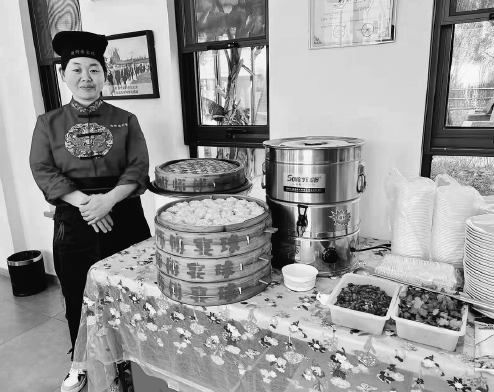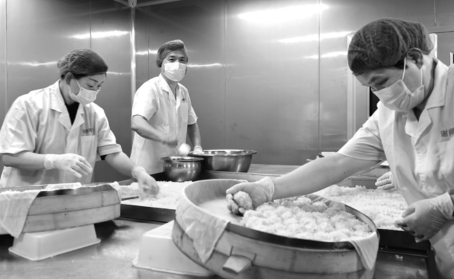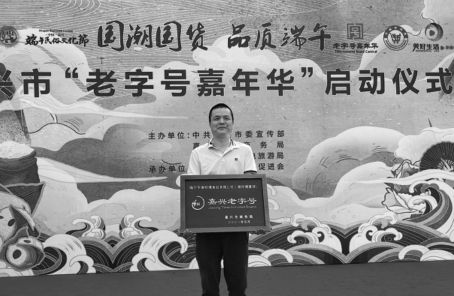Roll model
Tan Xiaofeng has transformed the traditional cultural heritage of making yanqiu, or "banquet balls", into a roaring commercial success, Yang Feiyue reports.

If you drop by Chang'an town as a guest, residents are mostly likely to serve yanqiu — a special type of meatball — to show the best of their hospitality.
According to local folklore, the origin of the dish dates back to a visit by Qing Dynasty (1644-1911) Emperor Qianlong to the town in Haining city, Jiaxing, in the northern part of East China's Zhejiang province.
"He was on a secret patrol of Haining, and tasted the local delicacy made from fish, pork and pork skin at an ordinary farmhouse," says Tan Xiaofeng, a local who has made a business out of selling yanqiu.
"Because it tasted so good, he named it yanqiu, meaning 'banquet ball', suggesting that the dish could be served at official functions," Tan explains.
Ever since, yanqiu has become an indispensable local dish to celebrate festivals and is also a popular gift for friends and relatives, as, in China, the circular shape represents completeness and a sense of safety.
At Tan's production facility, workers dressed in white uniforms work in groups of three, with one skillfully scooping out the meat paste from a large basin with his left hand. As if performing a magic trick, he shapes it into a meatball in a split second, tosses it onto a spoon in his right hand, before throwing it onto a large plate.
The other two workers then gently roll the meatballs, evenly coating them with a layer of shredded pork skin, and a yanqiu is created. They are then delivered to customers, who steam them for eating.
They can make 400 yanqiu, each weighing 40 to 60 grams, in 10 minutes.
"Business has been very good," Tan says.
In 2010, the yanqiu craft was named an intangible cultural heritage in Jiaxing city.
Although Chang'an yanqiu has a long-established reputation, local families used to make it only for special occasions.
"It was too troublesome to make, and to have both fish and pork was expensive. Ordinary families couldn't afford it," says Tan, who is in his 40s.
After careful preparation, only 30 percent of a fish can be used to make yanqiu, he says.
While the general recipe has been passed down among families, and the ingredients have mostly remained the same, each family has come up with its own preparation method.
Yet, for centuries, no one thought to sell yanqiu at the market.
Tan says that the commercial popularization of the local specialty started with Xie Yifei, his father-in-law, when the latter tried to sell the product to fellow villagers in the 1990s.
"It was on a whim," says the 70-year-old Xie, who was a professional carpenter, and who picked up the yanqiu craft from his father.
Production is complicated, with one of the main ingredients being fish, preferably silver carp. Each one weighs around 1.5 kilograms.
Another main ingredient is fatty pork, which distinguishes Chang'an yanqiu from ordinary fish balls.
"Adding fatty pork makes it more fragrant and gives it a richer and more substantial taste," Xie explains.
After the meatball is fashioned by hand out of mashed fish and pork, it is rolled over shredded pork skin, which will stick to and wrap the outside of the meatball.
"It is then crispy on the outside and soft in the middle, providing a rich mouthfeel," Xie says.
To his surprise, the first 28 yanqiu meatballs he made using three fish drew the attention of villagers he met on the way to the local central food market, and they sold out before he even got there.
It gave Xie a glimpse of the potential business opportunity, and thus encouraged him to run with his idea of selling yanqiu.
"In the beginning, I just sold it during major holidays, but business started to take off, with many placing orders ahead of time," Xie says.
It prompted him to set up a stand at the central food market.
In fact, Xie's move was so groundbreaking that he struggled to get a sales license.
"Yanqiu didn't really belong to the deli or the non-deli sections that were all there were then," he says.
After he got things straightened out, people couldn't get enough, with 2,000 yanqiu being sold on a good business day.
As Xie started to make a name for himself, he had customers who came all the way from other cities to buy his yanqiu.
Tan realized the business potential after seeing his father-in-law doing so well.
He says he was impressed by his yanqiu the first time he visited him.
"My father-in-law was one heck of a cook, and people obviously loved the yanqiu he made. More importantly, people's financial situations were improving," Tan says, explaining the signs he recognized that led to him scaling up the business.
Tan had developed a certain business acumen by selling clothes and realized that a lot needed to be upgraded before it would be possible to industrialize yanqiu production.
"The fish meat was inconsistently chopped, and the ingredients were added based on experience, leading to inconsistency in the flavor," Tan says.
After inheriting the traditional method of making yanqiu, in 2007, Tan knuckled down to the business of building a factory, investing more than 400,000 yuan ($55,272) into the project.
"The money back then could have bought a three-story building in our area, and many relatives and friends didn't understand the decision, asking me how many yanqiu we would have to sell just to break even," Tan recalls.
It was only thanks to support from his wife, Xie Yafen, and other family members, that he got through the growing pains of the business.
Ground rules were laid from the beginning, including using only fresh fish meat and traditional craft, especially during the manual steps.
"For example, the pieces of fish are soaked in water for a while to get rid of the blood, ensuring there is absolutely no fishy smell," Tan says.
"Ginger is used to complement the taste, but it has to be 'hidden' so the guests won't notice its existence," he adds.
Moreover, machines have been introduced to better churn the deboned fish chunks to the degree that an elastic texture is acquired.
Additionally, ingredient amounts have all been standardized after fine-tuning, based on feedback from multiple big tasting events.
More flavors have also been offered to cater to the diverse preferences of customers.
"Some have bamboo shoots and ham added to them," Tan says.
Initially, Tan and his wife drove a secondhand van to peddle yanqiu in neighboring areas, and participated in food expos in big cities like Shanghai.
Gradually, though, they have made their presence felt in the market across the country.
In turn, the booming company has created business and job opportunities for locals.
Ma Fuli, a local fish dealer, has a steady order for hundreds of kilograms of fish from Tan on a daily basis, and has supplied him for years.
"I have the fish ready the way he has requested and deliver it at 3 am every day," Ma says.
Earlier this year, Tan moved into a much bigger facility in Chang'an to expand his business further, and hired dozens of villagers in their 50s and 60s.
One of Tan Xiaofeng's employees, Tan Xiaoqian has been making yanqiu for almost a decade, and earns more than 5,000 yuan a month.
Years of experience has enabled him to produce yanqiu at the required size within a very small margin of error.
Currently, the family factory can produce approximately 40,000 yanqiu a day, without any leftover stock.
At the new facility, a museum recounting the history of yanqiu has been set up and is open to visitors.
For Tan Xiaofeng, yanqiu is not just a business anymore. He has taken being named an intangible heritage inheritor by the Haining government as a mission to promote the local dish to a national audience, which he does through livestreaming.
"Customers from Beijing and Xi'an (capital of Shaanxi province) often come to us to buy in wholesale quantities," he notes. "Maybe one day we will sell our yanqiu overseas."



Today's Top News
- Chengdu games hailed as the new benchmark
- Xi, Lula pledge to deepen China-Brazil cooperation
- China, US reach deal to extend tariff suspension
- Demand for?Nvidia’s H20 chip lackluster
- Washington not incarnation of justice: China Daily editorial
- Tariff truce gains time for talks although some tough issues remain to be resolved





























